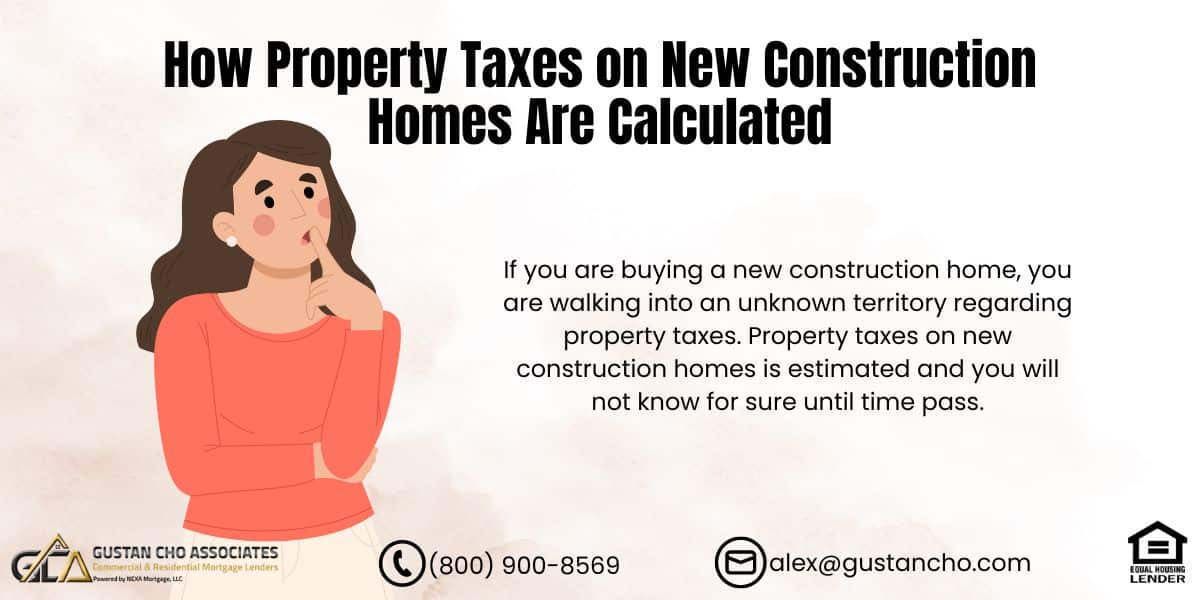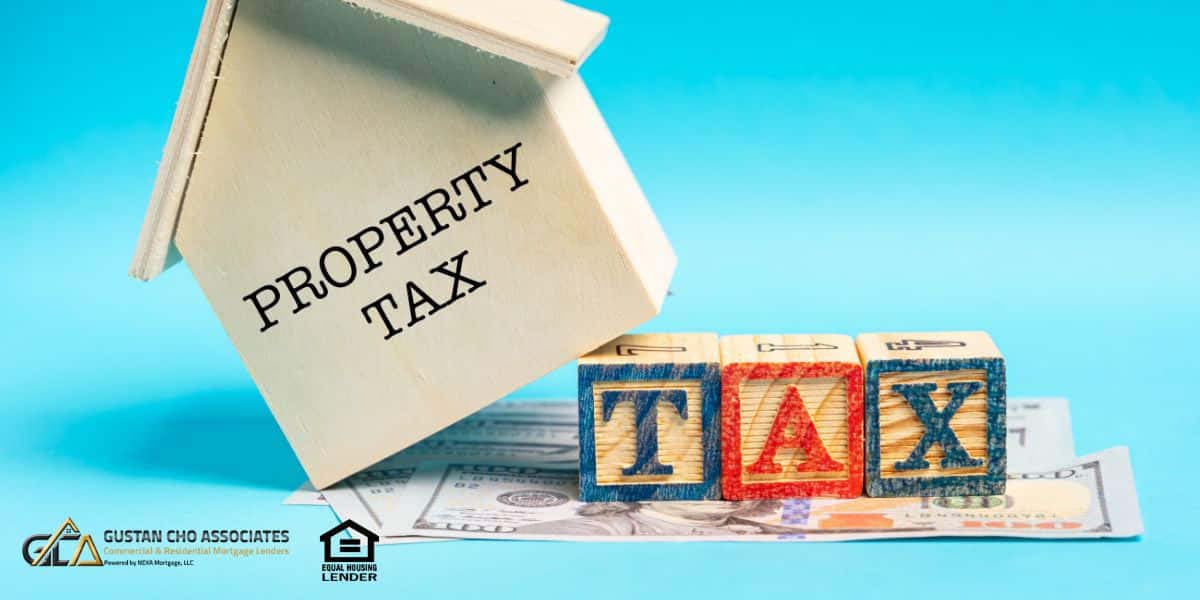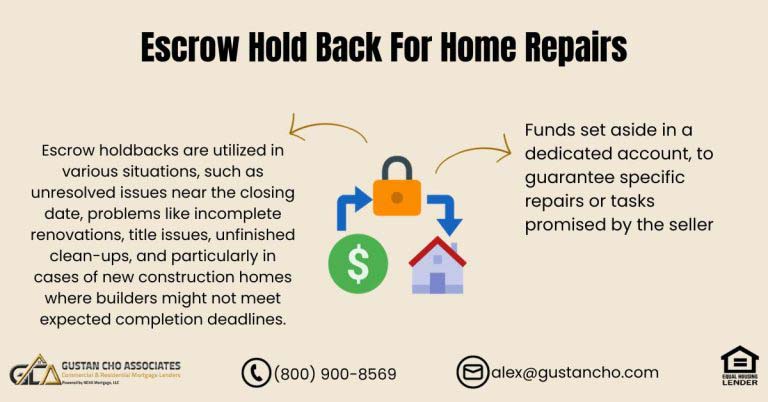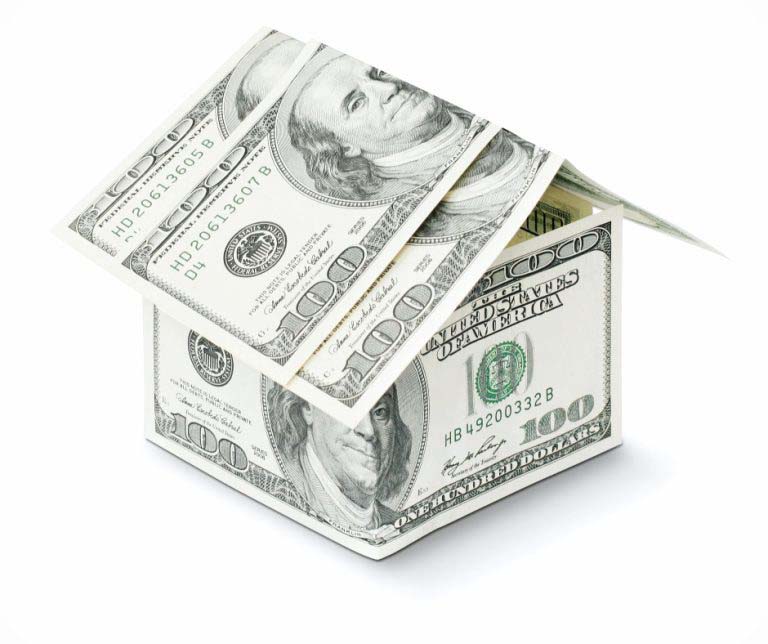This blog will discuss how mortgage underwriters calculate property taxes on new construction homes. Property taxes on new construction homes can often affect the homebuyer’s debt-to-income ratio due to being estimated versus an exact number. The exact property taxes on new construction homes are not known until a few years after the development has been completed.
Many home buyers are gravitating towards new construction homes offered by builders. The final property tax numbers will not be known until the community has been fully developed.
Mortgage underwriters must determine a number when qualifying and underwriting the borrower. In certain ways, mortgage underwriters determine property taxes on new construction homes when processing and underwriting a borrower. In the following paragraphs, we will cover how mortgage underwriters calculate property taxes on new construction homes.
How Are Property Taxes on New Construction Homes Assessed
Property taxes on new construction homes can vary depending on several factors, including location, assessed value, and local tax rates. We will cover key points about property taxes on new construction homes:
How Assessed Value Determine For Property Taxes on New Construction Homes
Property taxes are typically based on the home’s assessed value, which the local tax assessor’s office determines. For new construction homes, the assessed value is usually based on the home’s purchase price or appraised value at completion. Tax rates vary from jurisdiction to jurisdiction and can include taxes levied by municipalities, counties, school districts, and other local entities. Property tax rates are a percentage of the property’s assessed value.
Tax Assessment Timeline
In many areas, property tax assessments are conducted periodically, often annually or biennially. However, when a new construction home is completed, the tax assessor may reassess its current value for tax purposes. Some jurisdictions offer tax incentives for new construction homes, such as temporary property tax exemptions or abatements. These incentives are often designed to encourage economic development, revitalization, or investment in certain areas.
Wondering how property taxes are assessed on new construction homes?
Get the answers you need and apply now to secure your financing today!
Special Assessments on Property Taxes on New Construction Homes
In addition to regular property taxes, new construction homeowners may be subject to special assessments for public infrastructure improvements, such as roads, sidewalks, or utilities, that benefit the property.
If you believe that your property has been over-assessed or that your tax bill is incorrect, you may have the option to appeal the assessment through a formal process with the local tax assessor’s office or appeals board.
If you have a mortgage on your new construction home, your property taxes may be included in your monthly mortgage payments and held in an escrow account by your lender. The lender then pays the property taxes on your behalf when they are due. New construction homebuyers must research and understand the property tax implications in their area, including any potential exemptions, abatements, or special assessments. Consulting with a local real estate agent or tax professional can provide valuable insight into the property tax landscape in your desired location.
Buying Existing Versus New Construction Homes
To calculate property taxes on new construction homes is not as easy and straight forward as it is on pre-existing homes. However, estimated property taxes must be used on new construction homes. Underwriters want to ensure they do not underestimate the property taxes on new construction homes at the last minute.
A homebuyer of a new construction home with high debt-to-income ratio can be a risk of surpassing the maximum cap on their DTI if the numbers of the property taxes come in higher than the estimated amount. I
If you are buying a new construction home, you are walking into an unknown territory regarding property taxes. Property taxes on new construction homes is estimated and you will not know for sure until time pass. Property taxes on new construction homes. can be tricky and a risk for a borrower with high debt-to-income ratio. The mortgage underwriter’s main focus is the ability to repay the new housing payment.
How Property Tax Numbers Are Assessed on New Construction Homes
Purchasing new construction homes is much different than buying pre-owned homes when it comes to property taxes. How mortgage underwriters calculate property taxes on new construction homes may impact buyers with higher debt-to-income ratios. Property taxes on new construction homes are normally much higher than taxes on pre-owned homes.
Property taxes fluctuates and is not fixed rate throughout the term of the loan. If property tax increases, the homeowner will see their monthly housing payment increase.
Underwriters count on historical numbers when it comes to property taxes. Without historical figures, what is the number of proposed property taxes as part of PITI? This blog will cover how mortgage underwriters calculate property taxes on new construction homes. High property taxes on new construction homes will impact the borrower’s repayment ability if the borrower has higher debt-to-income ratios.
How Do Underwriters Calculate Property Taxes on New Construction Homes
All mortgage underwriters are very careful when calculating property taxes on new construction homes with no prior property tax history. Property taxes on new construction homes often stress home buyers. Assessing property taxes on a new construction home involves several steps and considerations. The process can vary by jurisdiction. In this guide, we will cover some general factors that assessors commonly take into account.
The property’ market value is often etermined is through a comparison with similar properties in the area (comparable sales approach), the cost of construction, and the potential income the property could generate (income approach).
Assessors typically start by determining the property’s market value. The assessor considers the cost of constructing the new home. This includes materials, labor, and any additional expenses associated with the construction process. The value of the land on which the new home is built is a crucial component of property tax assessment. Assessors often evaluate land value separately from the value of the structures on the property.
Start Your Process Towards Buying A New Construction Homes
Apply Online And Get recommendations From Loan Experts
How The County Determine Property Taxes on New Construction Homes In Relation to Assessment
It’s important to note that property tax assessment processes can vary widely depending on the local jurisdiction. Homeowners who disagree with their property tax assessments often have the right to appeal the valuation, and this process also varies by location. It’s advisable to contact the local assessor’s office or tax authority for specific information about how property taxes are determined in a particular area.
Factors To Consider When Buying New Construction Homes
Most home buyers have a specific budget for their monthly housing payments. The principal and interest rates are fixed, and the property taxes on pre-owned homes are fixed unless the township or county increases them on pre-owned homes. However, the potential uncertainty of property taxes on new construction homes often adds stress to the home-buying process.
Property taxes on new construction homes can change in the future. All counties in the United States levy property taxes on real estate properties.
All homeowners are required to pay property taxes. There is no set formula for how much homeowners pay. Every local government entity, city, town, and county assesses taxes differently. How underwriters calculate property taxes on new construction homes is through the millage for the area where the home is located. The millage rate is the real estate tax due per $1,000 in assessed value and is presented as a percentage.
How To Calculate Property Taxes on New Construction Homes
Let’s take a case scenario: If a home is valued at $400,000 and the mill levy (the millage rate) is set at one percent, multiplying the assessed value of $400,000 by 0.1% will yield $4,000. The millage tax rate will be $4,000 a year. There can be additional taxes besides the millage property taxes.
The township, town/city, county, and school districts can also require special assessments. Some areas with the top school districts often have higher tax rates than other municipalities or townships.
Property Taxes on new construction homes in areas with top school districts may require an additional 1.0% school district tax and another 1.0% township tax. So the estimated property taxes on new construction homes in this area will be the sum of the mill levy plus the school district plus the township tax: 1.0% mill levy + 1.0% school district + 1.0% township taxes, which yields 3.0%, or $12,000, on a $400,000 assessed new construction home purchase.
The Role of The County Assessor in Assessing Property Values vs. Taxes
The assessor of the local government municipality is the officer who determines assessments. The assessors’ office determines the real estate assessment using several factors. Assessors take into account the specific features and improvements of the new construction, such as the size, quality, and design of the house, as well as any additional structures (garages, sheds, etc.).
Assessors will determine a home’s value after using comparable properties in the area. The assessor’s assessed value is what determines property taxes on individual homes.
The starting point on how county real estate assessors assess homes is by examining like and similar properties to the subject home. This can be a no-brainer in a subdivision with many similar model homes. However, free-standing homes not in a subdivision can be more tricky, especially custom homes.
Are Property Taxes Based on the Purchased Price of the Home?
New construction homes are different than other homes in the area. There are no two of the same properties. Most homeowners do not have any idea how their property is given an assessed value. Local tax laws and regulations play a significant role in property tax assessment. Different jurisdictions may have different rules and methods for determining property values and calculating taxes.
A real estate property’s assessed value determines how much the property taxes are assessed. It is also the determinant of whether or not homeowners deserve an increase or decrease in their real estate taxes.
Homes with the same square footage with the same amount of bedrooms and bathrooms may have unique and distinct features such as brick versus frame and major material differences in interior and exterior materials used. Assessors may conduct physical inspections of the property to verify its characteristics and ensure that the information on record is accurate.
Assessed Value Versus Taxed Value of Homes
Let’s take an example of two homes: Each is built on a standard 0.25-acre lot. Both homes are 2,000 square feet. Both homes have three bedrooms, two baths, and two-car attached garages. However, home number one costs $200,000 to build, and the second home costs $500,000. You will get a better price if you were to build a home versus buying an existing home.
Some jurisdictions use assessment ratios to determine the assessed value of a property as a percentage of its market value. Equalization factors may also be applied to ensure consistency in tax assessments across different areas.
The second home has top-of-the-line exterior brick, custom millwork, a pond with a waterfall, top-of-the-line appliances, top-of-the-line kitchen and baths, and a finished walkout basement. So, is the second home assessed at a higher value than the first comparable home under the assessor’s eyes? The assessor does not care about the bells and whistles of the home. Home Assessment is based on the square footage, bedrooms, bathrooms, and lot size.
How Do County Assessors Determine Property Taxes on Rental Properties?
Not all single-family homes are owner-occupant homes. Many homeowners do not necessarily sell their owner-occupant homes when they upgrade to a larger home. They may decide to keep their existing home as a rental. Homeowners who recently purchased a home may get a job transfer to another state without notice and may need to rent out their owner-occupant home.
Some homeowners rather rent out they’re exiting home and keep it as an investment home than sell it. County Assessors can use the income assessment method on investment rental properties.
The income assessment method considers what the property owner makes after they have satisfied maintenance and other rental property costs. The assessment value of the subject income property is derived after the assessor analyzes the investment property. Investment property owners normally pay higher property taxes than owner-occupant homeowners.
How Are Property Taxes on New Construction Homes Assessed?
Homebuyers who purchase a pre-owned home or an investment property will have higher property taxes. Mortgage underwriters will calculate the higher tax amount when calculating borrowers’ debt-to-income ratios. However, once home buyers move in on their home purchase, they can claim owner-occupant and get the taxes reduced. Owner-occupant tax rates are significantly lower than investment tax rates on real estate. However, it does take time. There are many counties where that exempt property taxes from disabled veterans. Homeowners who think they are paying higher property taxes than their neighbors can always contest their property taxes. Many attorneys specialize in property tax appeals. No money upfront is needed. Attorneys will charge a percentage of the savings.
How Much Are Property Taxes on New Construction Homes
Paying property taxes is part of homeownership. Homeowners who have their homes paid for with no mortgage still need to pay real estate taxes for as long as they own their homes. The timing of the assessment can affect the property tax amount. Assessments may occur annually, biennially, or on some other schedule, and the tax may be based on the property’s value as of a certain date.
Figuring out the down payment on a home purchase is simple because it is a percentage of the home’s purchase price. However, property taxes on each home is different.
There is no fixed percentage you can use for property taxes. Property taxes is different depending on the city, county, and state. All government loan programs (FHA, VA, USDA) require property tax and insurance escrows. Conforming loans allow homeowners to pay their real estate taxes independently if they have more than 20% equity where no escrow is required.
How To Get a Mortgage on a New Construction Home?
The team at Gustan Cho Associates are experts in qualifying, approving, and closing mortgages on new construction homes. Many homebuyers ask us at Gustan Cho Associates if getting a loan to build a house is hard. Homebuyers with 20% or larger down payment can avoid private mortgage insurance on conventional loans.
Gustan Cho Associates has one time construction loan. It cover land acquisition, construction, and once the construction is done, the one time construction loan with turn into a permanent 30-year fixed-rate loan.
Not only do we have a no-lender overlay business model on government and conventional loans, but we also have hundreds of non-QM and alternative mortgage loan programs.
Get Qualified and Approved For a New Construction Home Today
Homebuyers of new construction homes who need to qualify for a mortgage with a mortgage company with no overlays can contact us at Gustan Cho Associates at 800-900-8569 or text us for a faster response. Or email us at gcho@gustancho.com. Over 80% of our borrowers are folks other lenders turned down due to their mortgage overlays.
The team at Gustan Cho Associates are experts in helping borrowers with prior bad credit and credit scores down to 500 FICO. Over 80% of our clients are folks who could not qualify at other lenders.
We are mortgage brokers licensed in 48 states, including Washington, DC, Puerto Rico, and the U.S. Virgin Islands. The team at Gustan Cho Associates is available seven days a week, on evenings, weekends, and holidays. Gustan Cho Associates is licensed in 48 states and has a wholesale lending network of over 210 wholesale investors. We have lending partnerships with wholesale lenders of government and conventional loans with no overlays, non-QM loans, and alternative financing programs.
FAQ: How Property Taxes on New Construction Homes Are Calculated
- 1. Why are property taxes on new construction homes challenging to calculate? Property taxes on new construction homes can be challenging because they are estimated until a few years after the development is complete, unlike pre-existing homes where taxes are known.
- 2. How do estimated property taxes impact borrowers? Borrowers of new construction homes may need help if actual property taxes exceed estimates, potentially impacting their debt-to-income ratios and affordability.
- 3. What factors determine property taxes on new construction homes? Property taxes are based on factors like assessed value (often the purchase price or appraised value at completion), local tax rates, and potential special assessments for public improvements.
- 4. How are property taxes assessed on new construction homes? Assessors determine property tax assessments by considering construction costs, land value, comparable properties, and local tax laws.
- 5. Can property tax assessments change over time for new construction homes? Assessments can change periodically or due to reassessment after new construction is completed, potentially affecting property tax amounts.
- 6. How do mortgage underwriters factor property taxes into borrowers’ debt-to-income ratios? Underwriters consider estimated property tax amounts to ensure borrowers can afford their housing payments within acceptable debt-to-income ratios.
- 7. What can borrowers do if they believe their property taxes must be corrected? Borrowers can appeal assessments through a formal process with the local tax assessor’s office or appeals board if they believe their property taxes are inaccurate.
- 8. How can borrowers prepare for property taxes on new construction homes during the mortgage process? Borrowers should research potential property tax implications, understand local tax laws, and consult with real estate agents or tax professionals for insights.
- 9. Can property taxes on new construction homes be fixed or changed? Property taxes can change over time due to reassessment, tax rate changes, or special public improvements assessments.
- 10. What role does the county assessor play in determining property taxes on new construction homes? County assessors assess property values, which determine property taxes, using various factors like property features, comparable properties, and local tax laws.
Get Qualified and Approved For a New Construction Home Today
apply now for the right mortgage loan











